| |
 |
1. ePayment@ CUHK |
 |
|
From now on, students can pay tuition fees, hostel fees or penalties online via the newly launched ePayment system.
After logging into the ePayment system with your student IDs and Campus Wide E-mail System (CWEM) passwords, a full list of debit items, including amount and status of payment will be displayed. Registered PPS users could then make payments through the Internet on or before the due date, providing unprecedented convenience.
To maximize security, the ePayment system adopts Secure Sockets Layer (SSL) 128-bit encryption for data transfer to ensure secure flow of information.
Details >>>
|
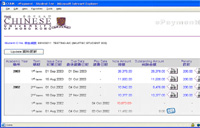
Through the ePayment system, you can check your balance or pay your tuition fees safely through the Internet.
|
|
 |
2. Enhanced CUHK eCard Service - Chinese New Year Specials |
 |
|
With Chinese New Year just around the corner, we are pleased to provide a series of specially designed greeting eCards for you to send your blessings to your family/friends/business partners through Internet. These eCards are available in two categories, "Postcard" and "Chinese New Year Special", to suit your different needs.
Details >>>
|
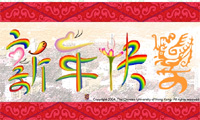
Send a Chinese New Year e-card to your family, friends and business partners today!
|
|
 |
3. An alternative Chinese Input Method - CKC 2002 |
 |
|
Coded with numbers, CKC is an easy-to-use Chinese Input System as users are only required to learn a few rules before using it. With its short learning curve which significantly increases efficiency, CKC has soon became popular after launching in China five years ago.
We have organized a site license programme for CKC 2002 Traditional Chinese version, which can be installed on Traditional Chinese Windows (98/ME/2000/XP) and Windows XP platforms. Besides PCs owned by the University, the license is also extended to the personal computers of University staff and students. CKC 2002 is also installed on all PCs of our User Areas (1/F Pi Ch'iu Building and Room 103 Wong Foo Yuan Building).
Details >>>
|
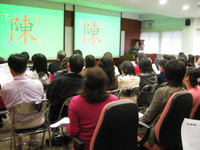
The instructor demonstrates how to use four digit numbers to enter the Chinese character "陳".
|
|
 |
4. New eLearning Programme for Staff |
 |
|
We are delighted to present a new series of interactive eLearning courseware, designed by LearnKey, to all University staff members. In this series, training on Office 2003, Macromedia MX 2004 and Adobe Photoshop CS are provided.
Details >>>
|
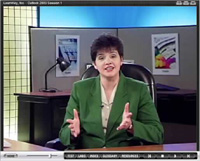
The LearnKey courseware features with video instructions with labs session and skill assessment and testing.
|
|
 |
5. Seminar Review on Digital Certificate Information Day |
 |
|
To explain the capabilities of Digital Certificate and its possible applications in Internet security, a series of seminars were held during The Digital Certificate Information Day on 14 Jan.
The seminars were well received by attendants, and we have received vast requests for course materials. You can now download the notes and view the video archive at ITSC website.
Details >>>
|
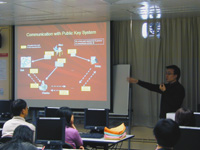
You can now watch the "Digital Certificate Information Day" seminar series video archive and download the course materials from the web.
|
|
 |
6. Computer Services During Chinese New Year Holidays (8 Feb - 13 Feb) |
 |
|
| Office |
Location |
Opening Hours |
| User Area |
Room 130-133 Pi Ch'iu Building |
24 hours daily |
| Consultation Room |
Room 133A Pi Ch'iu Building |
8 Feb 9am- 4:30pm
12 Feb 9am-12:30pm
Others: Closed |
Consultation Hotline Service
|
Phone: 3943 8845 |
8 Feb 9:00am-12:30pm
12 Feb 9am-12:30pm
Others: Closed |
| Information Counter |
G/F Pi Ch'iu Building |
12 Feb 9am-12:30pm
Others: Closed |
| Training Room 1, 2 and 3 |
Room 104, 122 and 127 Pi Ch'iu Building |
Closed |
| User Area |
Room 103 Wong Foo Yuan Building |
8 Feb 9:00am-12:30pm
12 Feb 9am-12:30pm
Others: Closed |
During the holidays, other computer systems and network services will continue operating as normal.
Details >>>
|
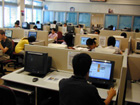
The User Area at Pi Ch'iu Building opens 24 hours daily during Chinese New Year holidays.
|
|
 |
7. Behind the Scenes : Software Site License - from Pains to Gains |
 |
|
Ever since computers entered the workplace, the increasingly complex software licensing issues have become very much a headache for users.
"There are a variety of licensing models adopted by software suppliers," explains Roger So from Microcomputer Application Support Section. "Some software is licensed to each individual computer while others are licensed according to the number of concurrent users, and some may even be licensed on per-CPU basis."
What complicates the matter further is the fact that some software may consist of a range of sub-products - each of which is licensed separately. So the purchaser/user has to read and comply with the licensing agreements.
For a widely used software, the availability of a site license can save a great deal of collective time, effort and expense for the University.
Details >>>
|
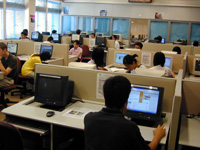
Ever since computers entered the workplace, the increasingly complex software licensing issues have become very much a headache for users. How does ITSC coordinate this matter for the University?
|
|
|
|
| |
|
|
|
